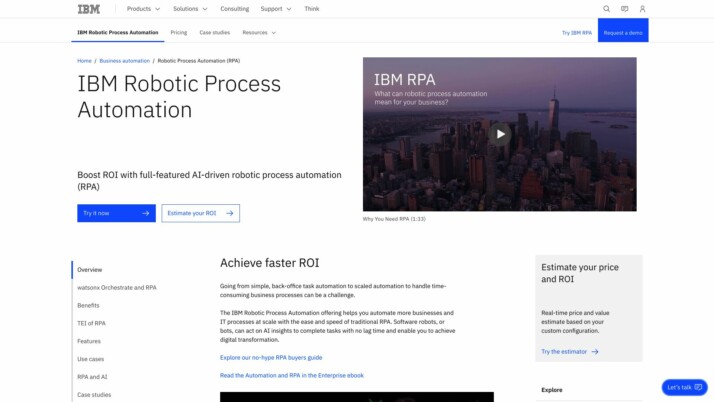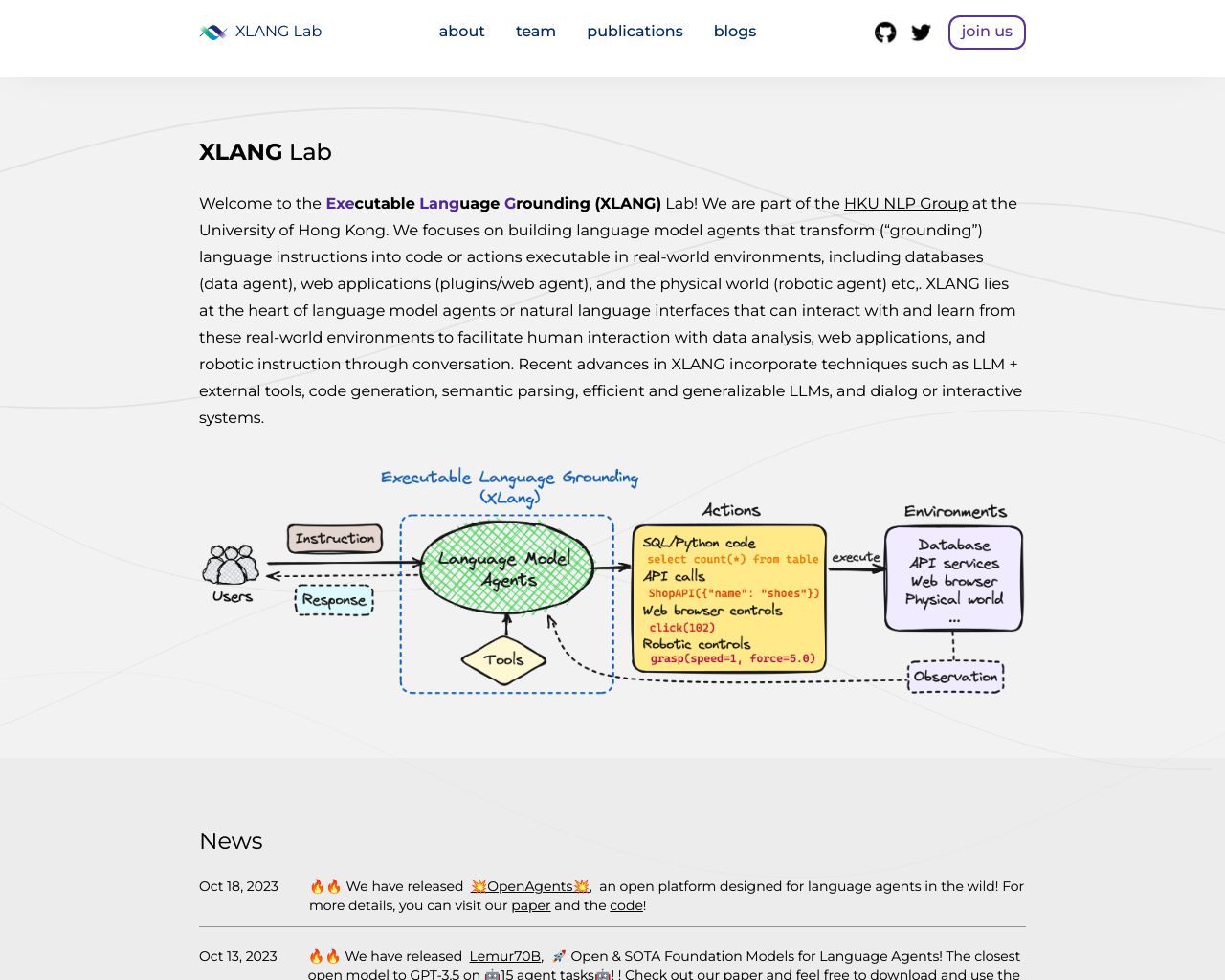IBM RPA vs. OpenAgents: Enterprise Power or Open-Source Flexibility?
AI-powered automation platforms transform business operations, enhancing efficiency and productivity. IBM RPA vs. OpenAgents represent two distinct approaches in this rapidly evolving field. IBM RPA delivers enterprise-grade robotic process automation with robust security and scalability, while OpenAgents offers an accessible, open-source platform centered on specialized AI agents.
This comparison explores their unique features, strengths, and limitations, helping you navigate the choices in AI automation. We’ll also introduce SmythOS, a powerful alternative that combines enterprise capabilities with user-friendly design, potentially offering the best of both worlds for businesses seeking to harness AI’s full potential.
IBM RPA Overview
IBM Robotic Process Automation (RPA) empowers organizations to automate repetitive tasks and streamline workflows across enterprise systems. This powerful platform combines AI-driven intelligence with scalable bot deployment to boost efficiency and reduce manual workloads.


At its core, IBM RPA offers a comprehensive suite for building, running, and managing software bots. The platform’s low-code authoring tools enable both developers and business users to create automation workflows visually. Pre-built commands and drag-and-drop functionality accelerate bot development, while AI integration through watsonx Orchestrate enhances decision-making capabilities.
IBM RPA offers a comprehensive suite for building, running, and managing software bots. The platform’s low-code authoring tools enable both developers and business users to create automation workflows visually.
IBM RPA shines in its enterprise-grade features. The platform supports both attended and unattended bots, allowing for human-in-the-loop processes and fully autonomous execution. Robust security measures, including data encryption and integration with IBM OpenPages for governance, ensure compliance and protect sensitive information. Scalability is a key strength, with concurrent bot execution and distributed runtime environments supporting large-scale automation initiatives.
While IBM RPA offers impressive capabilities, its enterprise focus may present a steeper learning curve for smaller organizations or individual users. The platform’s extensive feature set, while powerful, could potentially overwhelm those seeking simpler automation solutions. Additionally, pricing information is not readily available, which may complicate budgeting for potential adopters.
IBM RPA’s integration capabilities stand out as a major advantage. The platform seamlessly connects with a wide range of enterprise applications, including mainframes, APIs, and desktop software. This versatility allows organizations to automate processes across their entire technology stack, breaking down silos and improving overall operational efficiency.
OpenAgents Overview
OpenAgents delivers an open-source platform for creating, hosting, and managing AI agents. The system centers on three specialized agents: Data Agent for complex data analysis, Plugins Agent with over 200 integrations for diverse tasks, and Web Agent for autonomous web browsing.
Data Agent excels at processing large datasets, generating insights crucial for roles like marketing. Plugins Agent stands out with its extensive library, adapting to various user needs from weather checks to online shopping. Web Agent streamlines internet experiences through a Chrome extension, automating navigation and information retrieval.
OpenAgents delivers an open-source platform for creating, hosting, and managing AI agents. The system centers on three specialized agents: Data Agent for complex data analysis, Plugins Agent… and Web Agent…


OpenAgents emphasizes user-friendliness with a web UI and backend server, making AI agents accessible to non-experts. The platform allows deployment on localhost and integration of new agents and plugins, fostering adaptability. However, it lacks some advanced features like hosted vector databases or specialized crawlers for sitemaps or YouTube transcripts.
The vision behind OpenAgents aims to integrate language agents into daily life, bridging the gap between expert and non-expert users. By focusing on practical, real-world challenges, OpenAgents strives to make AI more accessible and useful in everyday contexts, from data analysis to task automation.
Feature Comparison
IBM RPA and OpenAgents offer distinct approaches to AI-powered automation, each with its own strengths and limitations. IBM RPA excels in enterprise-grade features, providing robust security measures and scalable bot deployment. Its low-code authoring tools and AI integration through watsonx Orchestrate enable both developers and business users to create sophisticated automation workflows. IBM RPA also offers strong integration capabilities with enterprise applications, APIs, and mainframes.
OpenAgents, on the other hand, focuses on accessibility and specialization. Its open-source platform centers around three main agents: Data Agent for complex data analysis, Plugins Agent with over 200 integrations, and Web Agent for autonomous web browsing. This approach makes AI more accessible to non-experts, emphasizing user-friendliness with a web UI and backend server. However, OpenAgents lacks some of the advanced enterprise features and security measures that IBM RPA provides.
While both platforms offer hosted environments and visual builders, IBM RPA’s enterprise focus results in more comprehensive security features, including data encryption and integration with IBM OpenPages for governance. OpenAgents, while more accessible, may not provide the same level of enterprise-grade security and compliance tools. This difference highlights the gap between a platform designed for large-scale business operations and one aimed at democratizing AI access.
Feature Comparison Table
| IBM RPA | OpenAgents | SmythOS | |
|---|---|---|---|
| CORE FEATURES | |||
| AI Agents | ❌ | ✅ | ✅ |
| Visual Builder | ✅ | ❌ | ✅ |
| No-Code Options | ✅ | ❌ | ✅ |
| Memory & Context | ❌ | ✅ | ✅ |
| Autonomous Agents | ❌ | ✅ | ✅ |
| Explainability & Transparency | ❌ | ✅ | ✅ |
| Multimodal | ❌ | ✅ | ✅ |
| Problem-Solving Capabilities | ❌ | ✅ | ✅ |
| Multi-Agent Collaboration | ❌ | ✅ | ✅ |
| Work as Team | ❌ | ✅ | ✅ |
| Agent Work Scheduler | ✅ | ❌ | ✅ |
| SECURITY | |||
| Constrained Alignment | ❌ | ❌ | ✅ |
| OAuth | ❌ | ✅ | ✅ |
| IP Control | ❌ | ❌ | ✅ |
| COMPONENTS | |||
| Foundation AIs | ❌ | ✅ | ✅ |
| Huggingface AIs | ❌ | ✅ | ✅ |
| Zapier APIs | ❌ | ✅ | ✅ |
| Classifiers | ❌ | ✅ | ✅ |
| Data Lakes | ❌ | ❌ | ✅ |
| DEPLOYMENT OPTIONS (EMBODIMENTS) | |||
| Deploy as Webhook | ❌ | ✅ | ✅ |
| Staging Domains | ❌ | ❌ | ✅ |
| Production Domains | ❌ | ❌ | ✅ |
| API Authentication (OAuth + Key) | ❌ | ✅ | ✅ |
| Deploy as Site Chat | ❌ | ✅ | ✅ |
| Deploy as Scheduled Agent | ✅ | ❌ | ✅ |
| Deploy as GPT | ❌ | ✅ | ✅ |
| DATA LAKE SUPPORT | |||
| Hosted Vector Database | ❌ | ❌ | ✅ |
| Sitemap Crawler | ❌ | ❌ | ✅ |
| YouTube Transcript Crawler | ❌ | ❌ | ✅ |
| URL Crawler | ❌ | ✅ | ✅ |
Best Alternative to IBM RPA and OpenAgents
SmythOS revolutionizes AI agent development with its comprehensive platform. We offer a superior alternative to IBM RPA and OpenAgents by combining powerful features with unparalleled ease of use. Our drag-and-drop interface enables rapid creation of sophisticated AI workflows without extensive coding knowledge, democratizing AI development across skill levels.
SmythOS revolutionizes AI agent development with its comprehensive platform… combining powerful features with unparalleled ease of use.
Unlike IBM RPA’s enterprise-focused approach or OpenAgents’ specialized agents, SmythOS provides a versatile solution applicable to countless use cases. We support integration with various AI models, APIs, and data sources, allowing users to build custom solutions for any industry or application. Our platform excels in multi-agent collaboration, enabling complex problem-solving through teams of AI agents working in concert.
SmythOS stands out with its robust security features and deployment options. We offer constrained alignment to ensure ethical AI behavior, data encryption, and OAuth integration for enterprise-grade security. Our platform allows deployment as APIs, webhooks, chatbots, or scheduled agents, providing flexibility unmatched by IBM RPA or OpenAgents.
While IBM RPA lacks true AI agent capabilities and OpenAgents focuses on specific agent types, SmythOS delivers a comprehensive ecosystem for AI development. We provide hosted environments, visual builders, and no-code options alongside advanced features like memory and context management, explainability tools, and multimodal support. This combination empowers users to create sophisticated AI solutions tailored to their unique needs.
SmythOS delivers a comprehensive ecosystem for AI development… empowers users to create sophisticated AI solutions tailored to their unique needs.
By choosing SmythOS, users gain access to cutting-edge AI technology with the flexibility to innovate across industries. Our platform’s intuitive design, extensive feature set, and unlimited use cases make it the ideal choice for organizations seeking to harness the full potential of AI agents in their operations.
Conclusion
IBM RPA and OpenAgents offer distinct approaches to AI-powered automation, each with unique strengths. IBM RPA excels in enterprise-grade features, robust security, and scalable bot deployment. Its low-code tools and AI integration enable sophisticated workflows, particularly suited for large organizations with complex IT ecosystems. OpenAgents, conversely, focuses on accessibility and specialization with its open-source platform centered around three main agents for data analysis, plugin integration, and web browsing.
While both platforms provide value, SmythOS emerges as the superior choice for businesses seeking a comprehensive, user-friendly AI automation solution. SmythOS combines the best of both worlds — enterprise-grade capabilities and accessibility — in a single platform. Our drag-and-drop interface, extensive integration ecosystem, and versatile deployment options make advanced AI functionalities accessible to users of all skill levels.
Unlike IBM RPA’s steep learning curve or OpenAgents’ limited enterprise features, SmythOS offers a balanced approach. We provide robust security measures, scalability, and compliance tools alongside an intuitive user experience. Our platform supports multi-agent orchestration, allowing for complex task collaboration, and offers unparalleled flexibility in deployment across various environments.
Experience the future of AI automation with SmythOS. Create a free account today and discover how our platform can revolutionize your workflows, boost efficiency, and drive innovation across your organization. With SmythOS, you’ll be creating and deploying AI agents 99% faster, unlocking unprecedented levels of productivity and innovation.
Last updated:
Disclaimer: The information presented in this article is for general informational purposes only and is provided as is. While we strive to keep the content up-to-date and accurate, we make no representations or warranties of any kind, express or implied, about the completeness, accuracy, reliability, suitability, or availability of the information contained in this article.
Any reliance you place on such information is strictly at your own risk. We reserve the right to make additions, deletions, or modifications to the contents of this article at any time without prior notice.
In no event will we be liable for any loss or damage including without limitation, indirect or consequential loss or damage, or any loss or damage whatsoever arising from loss of data, profits, or any other loss not specified herein arising out of, or in connection with, the use of this article.
Despite our best efforts, this article may contain oversights, errors, or omissions. If you notice any inaccuracies or have concerns about the content, please report them through our content feedback form. Your input helps us maintain the quality and reliability of our information.
